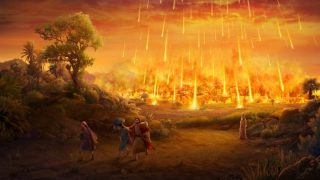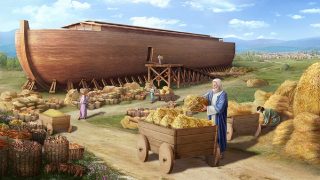Gen 9:11–13 And I will establish My covenant with you, neither shall all flesh be cut off any more by the waters of a flood; neither shall there any more be a flood to destroy the earth. And God said, This is the token of the covenant which I make between Me and you and every living creature that is with you, for perpetual generations: I do set My bow in the cloud, and it shall be for a token of a covenant between Me and the earth.
Next, let’s take a look at this part of the scriptures about how God made the rainbow as a symbol of His covenant with man.
Most people know what a rainbow is and have heard of some stories related to rainbows. As for the story about the rainbow in the Bible, some people believe it, some treat it as legend, while others don’t believe it at all. No matter what, everything that happened in relation to the rainbow is all things God once did, and things that took place during the process of God’s management of man. These things have been recorded exactly in the Bible. These records do not tell us what mood God was in at the time or the intentions behind these words God said. Moreover, no one can appreciate what God was feeling when He said them. However, God’s state of mind regarding this entire thing is revealed between the lines of the text. It is as though His thoughts at the time leap off the page through each word and phrase of God’s word.
God’s thoughts are what people should be concerned about and what they should be trying to get to know the most. This is because God’s thoughts are closely related to man’s understanding of God, and man’s understanding of God is an indispensable link to man’s entry into life. So what was God thinking at the time when these things happened?
Originally, God created a humanity that in His eyes was very good and close to Him, but they were destroyed by flood after rebelling against Him. Did it hurt God that such a humanity just instantly vanished like that? Of course it hurt! So what was His expression of this pain? How was it recorded in the Bible? It was recorded in the Bible as: “And I will establish My covenant with you, neither shall all flesh be cut off any more by the waters of a flood; neither shall there any more be a flood to destroy the earth.” This simple sentence reveals God’s thoughts. This destruction of the world pained Him very much. In man’s words, He was very sad. We can imagine: How did the earth that was once full of life look like after being destroyed by the flood? How did the earth that was once full of human beings look like now? No human habitation, no living creatures, water everywhere and an absolute mess on the surface of the water. Was such a scene God’s original intention when He created the world? Of course not! God’s original intention was to see life all across the land, to see the human beings He created worshiping Him, not just for Noah to be the only one worshiping Him or the only one who could answer His call to complete what he was entrusted. When humanity disappeared, God saw not what He had originally intended but the complete opposite. How could His heart not be in pain? So when He was revealing His disposition and expressing His emotions, God made a decision. What kind of a decision did He make? To make a bow in the cloud (note: the rainbow that we see) as a covenant with man, a promise that God would not destroy mankind with a flood again. At the same time, it was also to tell people that God had once destroyed the world with a flood, to let mankind forever remember why God did such a thing.
Was the destruction of the world this time something God wanted? It was definitely not what God wanted. We might be able to imagine a small part of the pitiful sight of the earth after the destruction of the world, but we cannot come close to imagining what the scene was like at the time in God’s eyes. We can say that, whether it is the people of now or then, nobody is able to imagine or appreciate what God was feeling when He saw that scene, that image of the world following its destruction by flood. God was forced to do this due to man’s disobedience, but the pain suffered by God’s heart from this destruction of the world by flood is a reality no one can fathom or appreciate. That’s why God made a covenant with mankind, which was to tell people to remember that God once did something like this, and to swear to them that God would never destroy the world in such a way again. In this covenant we see God’s heart—we see that God’s heart was in pain when He destroyed this humanity. In the language of man, when God destroyed mankind and saw mankind disappearing, His heart was weeping and bleeding. Isn’t that as best as we can describe it? These words are used by humans to illustrate human emotions, but since man’s language is too lacking, using them to describe God’s feelings and emotions doesn’t seem too bad to Me, and nor are they too excessive. At least it gives you a very vivid, very apt understanding of what God’s mood was like at the time. What will you think of now when you see a rainbow again? At least you will remember how God was once in sorrow over destroying the world by flood. You will remember how, even though God hated this world and despised this humanity, when He destroyed the human beings He created with His own hands, His heart was hurting, struggling to let go, feeling reluctant, and finding it hard to bear. His only comfort was in Noah’s family of eight. It was Noah’s cooperation that made His painstaking efforts of creating all things worthwhile. At a time when God was suffering, this was the only thing that could make up for His pain. From that point, God placed all of His expectations of humanity on Noah’s family, hoping they could live under His blessings and not His curse, hoping that they would never see God destroy the world with a flood again, and also hoping that they would not be destroyed.
What part of God’s disposition should we understand from here? God had despised man because man was in enmity to Him, but in His heart, His care, concern, and mercy for humanity remained unchanged. Even when He destroyed mankind, His heart remained unchanged. When humanity was full of corruption and disobedient toward God to a certain extent, God had to, because of His disposition and His essence, and in accordance with His principles, destroy this humanity. But because of God’s essence, He still pitied mankind, and even wanted to use various ways to redeem mankind so they could continue to live. Instead, man opposed God, continued to disobey God, and refused to accept God’s salvation, that is, refused to accept His good intentions. No matter how God called to them, reminded them, supplied them, helped them, or tolerated them, man did not understand or appreciate it, nor did they pay attention. In His pain, God still did not forget to give man His maximum tolerance, waiting for man to turn around. After He reached His limit, He did what He had to do without any hesitation. In other words, there was a specific time period and process from the moment God planned to destroy mankind to the official start of His work in destroying mankind. This process existed for the purpose of enabling man to turn around, and was the last chance God gave to man. So what did God do in this period before destroying mankind? God did a significant amount of reminding and exhorting work. No matter how much pain and sorrow God’s heart was in, He continued to exercise His care, concern, and abundant mercy on humanity. What do we see from this? Undoubtedly, we see that God’s love for mankind is real and not just something He is paying lip service to. It is actual, tangible and appreciable, not fake, adulterated, deceitful or pretentious. God never uses any deception or creates fake images to make people see that He is lovable. He never uses false testimony to let people see His loveliness, or to flaunt His loveliness and holiness. Aren’t these aspects of God’s disposition worthy of man’s love? Aren’t they worth worshiping? Aren’t they worth cherishing? At this point, I want to ask you: After hearing these words, do you think God’s greatness is merely words on a sheet of paper? Is God’s loveliness just empty words? No! Certainly not! God’s supremacy, greatness, holiness, tolerance, love, and so forth—all of these various aspects of God’s disposition and essence are put into effect every time He does His work, embodied in His will toward man, and also fulfilled and reflected on every person. Regardless of whether you have felt it before, God is caring for every person in every possible way, using His sincere heart, wisdom, and various methods to warm each person’s heart, and awaken each person’s spirit. This is an indisputable fact. No matter how many people are sitting here, each person has had different experiences of and feelings toward God’s tolerance, patience, and loveliness. These experiences of God and these feelings or acknowledgments of Him—in short, all of these positive things are from God. So by integrating everyone’s experiences and knowledge of God and combining them with our readings of these Bible passages today, do you now have a more real and proper understanding of God?



